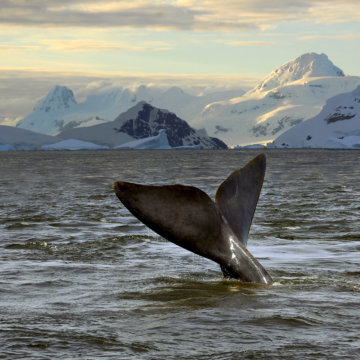- About
- Topics
- Story
- In-Depth
- Picks
- Opinion
- News
- Donate
- Signup for our newsletterOur Editors' Best Picks.Send
Read, Debate: Engage.
"Ross Sea?, ROSS Sea?" asks the New York City pedestrian the interviewer. "Where is that? East or West of Manhattan?"
Why New York? The tooth fish, for better marketing reasons labeled as Chilean Sea Bass, is being caught in large amounts and served in the most expensive restaurants primarily in North America.
If you're not a regular guest of these restaurants, you might not have heard of Ross Sea before either, until today, after 24 countries and the European Union, and years of negotiation came to together and decided to preserve 1,6 million square kilometers of ocean in the Antartica. Thus, this remote part of the Southern Ocean will gain protection from commercial fishing for 35 years.
The Ross Sea, its shelf and slope only comprise 2% of the Southern Ocean but they are home to 38% of the world's Adelie penguins, 30% of the world's Antarctic petrels and around 6% of the world's population of Antarctic minke whales.
The main cause for exploitation of the Ross Sea is commercial fishing, which began in 1996 when a single fishing vessel from New Zealand entered the pristine waters of the Ross Sea and discovered large numbers of Antarctic toothfish, a close relative of Patagonian toothfish. As news of this untapped resource spread, an international fishery soon developed.
The Ross Sea is the most pristine piece of Ocean on our suffering planet. Can you imagine that is the very last resort of our entire marine ecosystem that is somehow intact?
We have exploited and polluted our oceans so much, that scientists say this is our last chance to preserve a healthy bit of our marine ecosystem. We've come to a point that we need the Ross Sea as a laboratory to do research in an almost fully functioning natural ecosystem and see what pollutes the ocean. In other words the Ross Sea is our last healthy test subject within a sick population – like a doctor who examines the last healthy patient to find a cure to heal the rest.
We have now 35 years until the agreement expires. In the meantime Marine Conservation Institute, a leader in securing strong protection for the world’s oceans, urges world leaders to protect 30% of the planet’s oceans by 2030.
That's the next goal!
You can visit Last Ocean for further information, see the trailer of the documentary on the Ross Sea and sign to become a friend of the movement.
